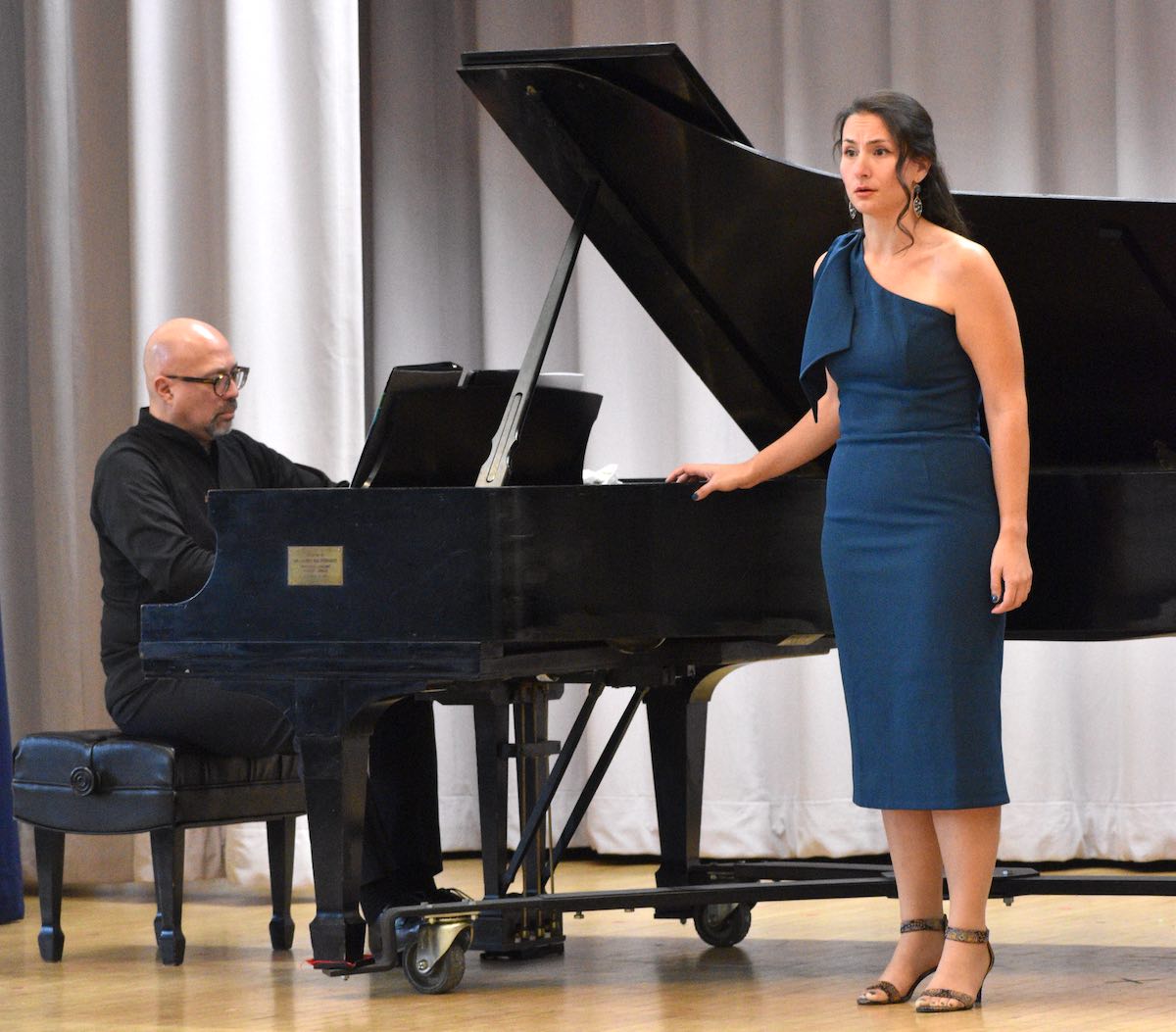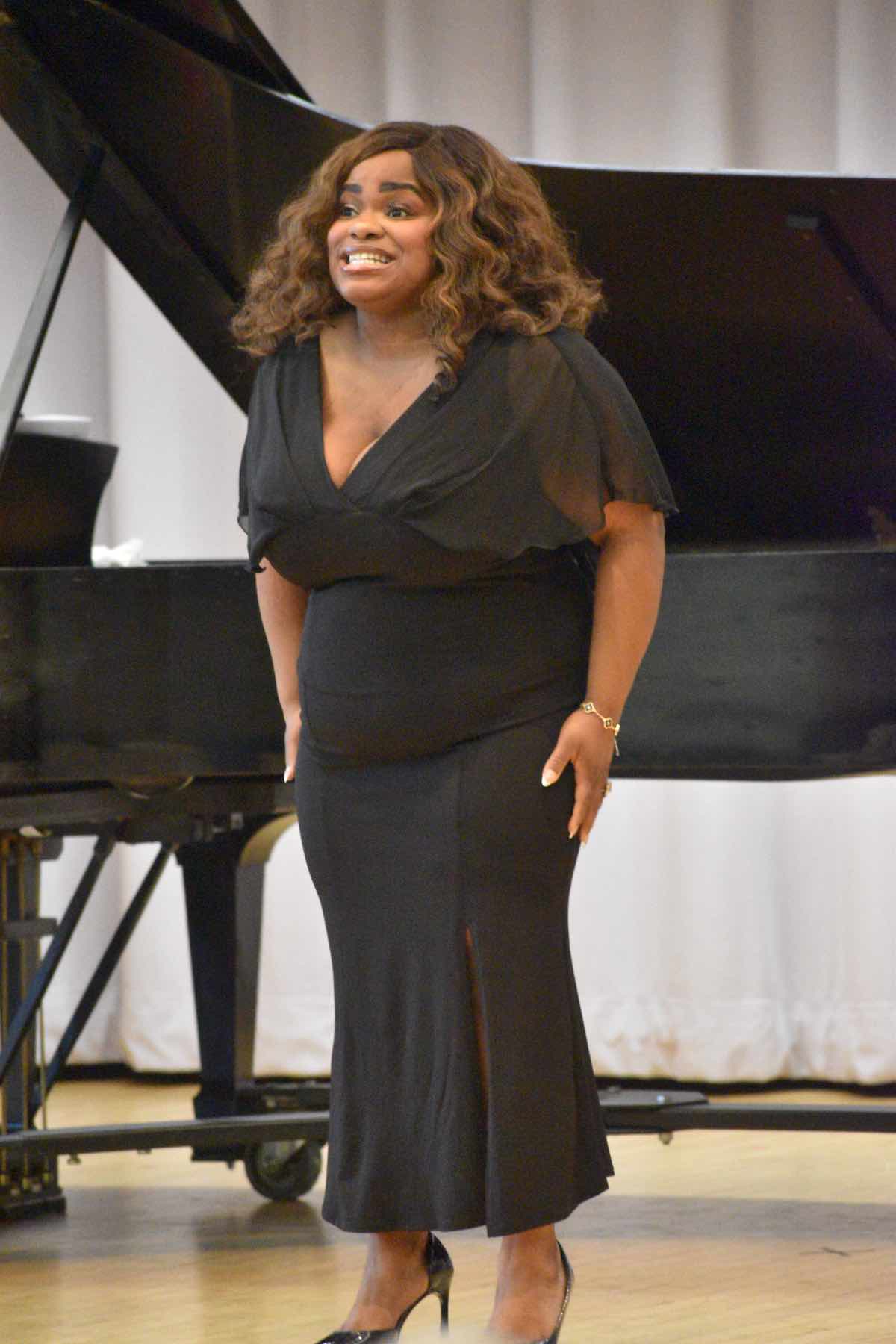Metropolitan Opera Visits South Philly to Find America’s Future Opera Stars
Queen Village's Settlement Music School was the place to be earlier this month.

Opera singer Krista Hastings performs at Settlement Music School for the Metropolitan Opera’s Laffont Competition.
On Sunday, November 10th, 25 of the country’s best young opera singers gathered at South Philadelphia’s Settlement Music School to perform in the Metropolitan Opera’s Laffont Competition. The 10 winners will advance to regional competition in Washington, D.C.. Semi-finalists will move on to New York City and, in March, the 10 finalists will perform at the Metropolitan Opera, with a full orchestra. For a young opera singer, it’s an honor akin to winning the Super Bowl and the final rose on The Bachelor, all on the same day.
Performers in sharp suits or elegant dresses and heels paced through Settlement’s lobby, or traipsed up and down the staircase to the rehearsal rooms. Trilling scales spilled out of the windows and mixed with the clatter of high heels, the shuffle of sheet music, the appreciative murmur of friends and family members who’d come to watch.
Imagine Olympic athletes, holding qualifying races at your local elementary school’s track, or Cirque du Soleil auditioning acrobats at your neighborhood playground, and you’ll get a sense of how the afternoon felt as some of the best young singers in the world assembled at a neighborhood music school, and took the stage.
Each of them had prepared four arias. They chose the first one; the judges, sitting at a table at the back of the room, conferred briefly before asking for a second selection.
The audience did not have the benefit of supertitles or a program to explain what they were hearing. The singers, accompanied only by pianist José Meléndez, the district’s co-chair, couldn’t rely on costumes or an orchestra or other cast members. They had to conjure their characters and the plot with nothing but their voice and gestures and expressions.
And they made it look easy.
In the competition’s first hour, the audience met a closeted gay man in 1950s Washington, singing about the home he and his beloved will never share in an aria from Fellow Travelers, followed by the wickedest of witches, doing a first-rate villain’s cackle in a selection from Humperdinck’s Hansel and Gretel, followed by a wide-eyed teenager in Tennessee, yearning for all the wide world holds, singing “Ain’t It a Pretty Night” from Susannah.
There were songs in French and Italian, English and German. There were performers from Philadelphia and New Jersey — and China, and Ukraine. There was singing so assured and passionate that it left the walls and the floorboards practically vibrating — and the audience utterly thrilled.
Settlement is one of the largest and oldest community schools of the arts in the United States. Since its founding in 1908, Settlement has served more than 300,000 students, and it is one of the largest employers of musicians in the tri-state area. Musical superstars like Questlove, actors like Kevin Bacon, and Nobel laureate Albert Einstein all studied at Settlement, which has as its mission making music accessible to everyone, and offering music lessons to any child in Philadelphia, regardless of ability to pay.
Still, when most people think of the institutions that make Philadelphia a world-class arts city, Settlement doesn’t always make the list.

Opera singer Beautiful Sheriff performs at Settlement Music School for the Metropolitan Opera’s Laffont Competition
That’s why Othalie Graham, soprano, opera star, and chair of the Philadelphia district, wanted Settlement to host the performance.
“Settlement is one of the most storied institutions in Philadelphia,” Graham says.
Not only does Settlement have a storied history — Philadelphia’s renowned soprano Florence Quivar got her start at the school — “this building has everything you need: practice rooms, on-site parking. This is the place,” Graham says. “And it deserves more attention than it gets.” She raises her hands. “Settlement and the Met. I want people to think of those two things together.”
Opera is a long game. Unlike pop stars, who might hit it big before they get their drivers’ license and be old news at twenty-two, opera singers in their 20s are just getting started, their voices still developing the flexibility and range and power. The judges are listening for potential — “a kernel of what the voice might become” in five or 10 years, says Melissa Wegner, the competition’s executive director, who was one of the judges along with Evans Mirageas, director of the Cincinnati Opera, and soprano Christine Goerke. “We’re listening for the voice — the instrument. For musicality — how they interpret the music,” Wegner says.
The young singers all seemed delighted to be there. Sopranos Beautiful Sheriff and Daniela Machado, both 24, looked pleased and relieved when they stepped off the stage. The women met as graduate students at Rice University. They’re both first-year students at Philadelphia’s Academy of Vocal Arts as well as roommates.
How does a twenty-something find her way to opera? For Sheriff, the journey began with harp lessons, then voice lessons. For Machado, it was growing up hearing stories about a grandfather in Colombia who’d sung opera, with musical theater as a gateway.
Listening to the young women talking about passaggio and portamento, the art of choosing an aria, and an outfit, and the difference between a competition and an audition, was like a crash course in Opera 101.
Both Sheriff and Machado understand the confusion when they tell strangers what they’re doing with their lives. “It’s a little niche,” Machado says. But both are confident that, once institutions take steps to remove barriers to opera, new fans will come. They pointed at Opera Philadelphia’s $11 ticket policy as instrumental for getting new people — an estimated 2,500 since the plan was announced in August — through the door.
“People don’t realize how alive the scene is,” says Machado.
If you were lucky enough to be in the audience at Settlement on that Sunday, you would know.
[Ed. Note: Bestselling novelist Jennifer Weiner, who wrote this article, is also a board member at Settlement Music School.]


